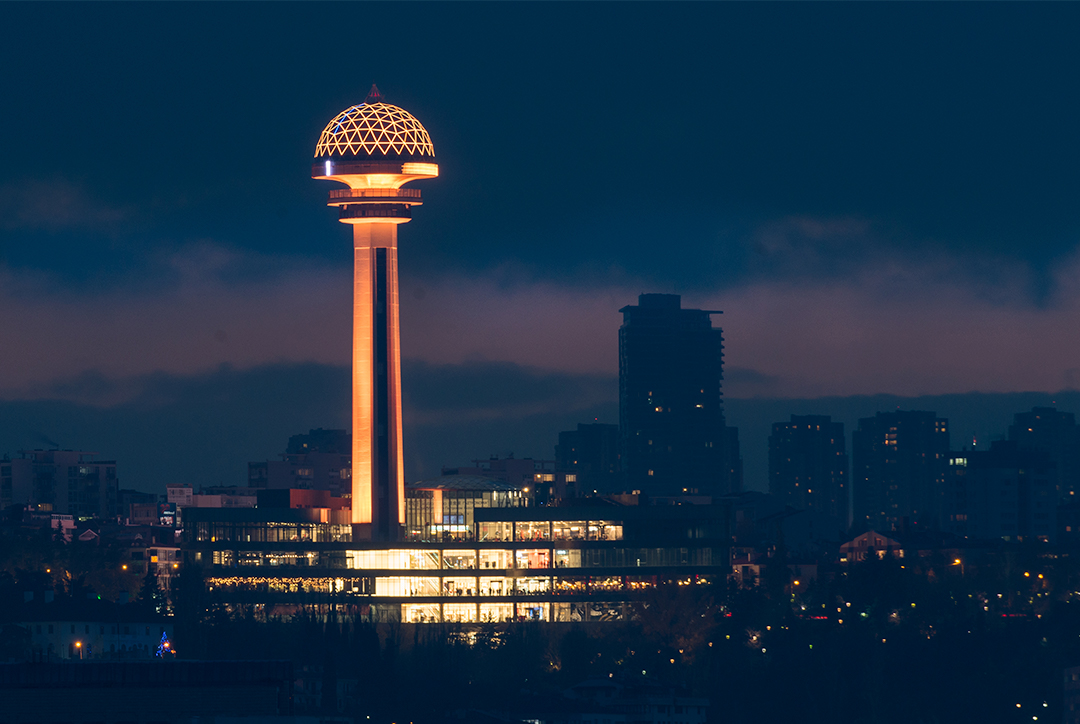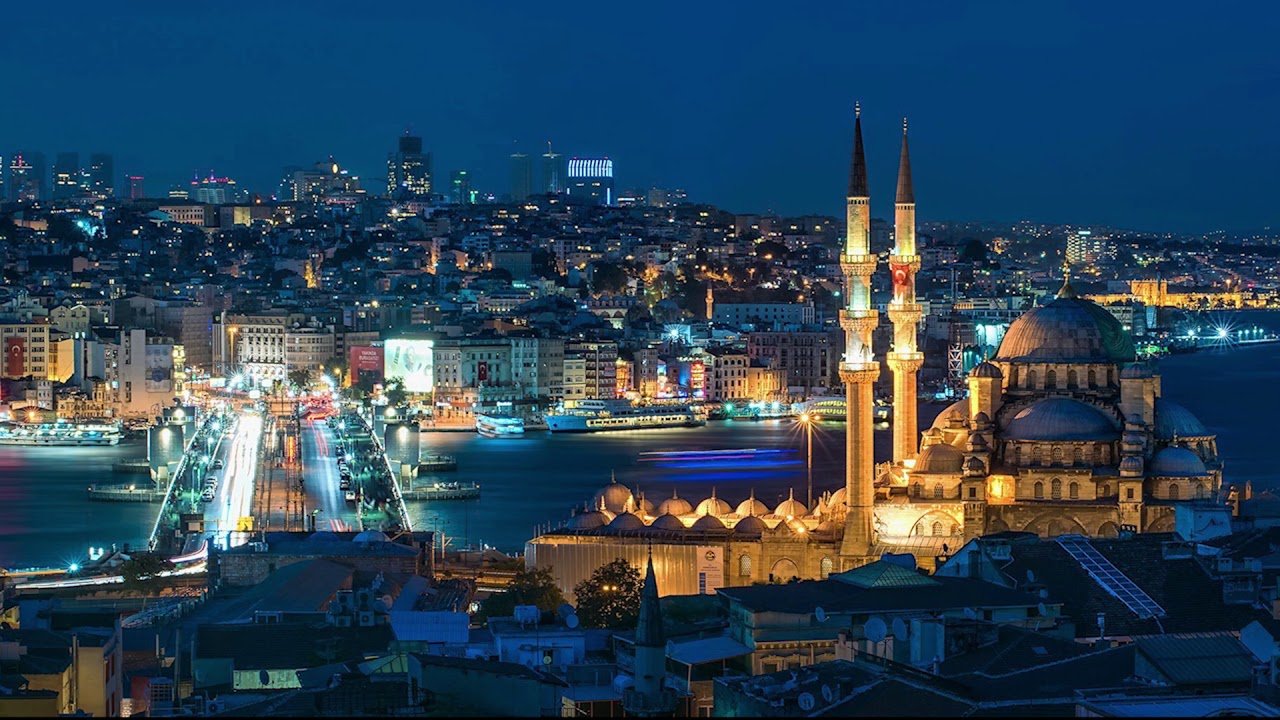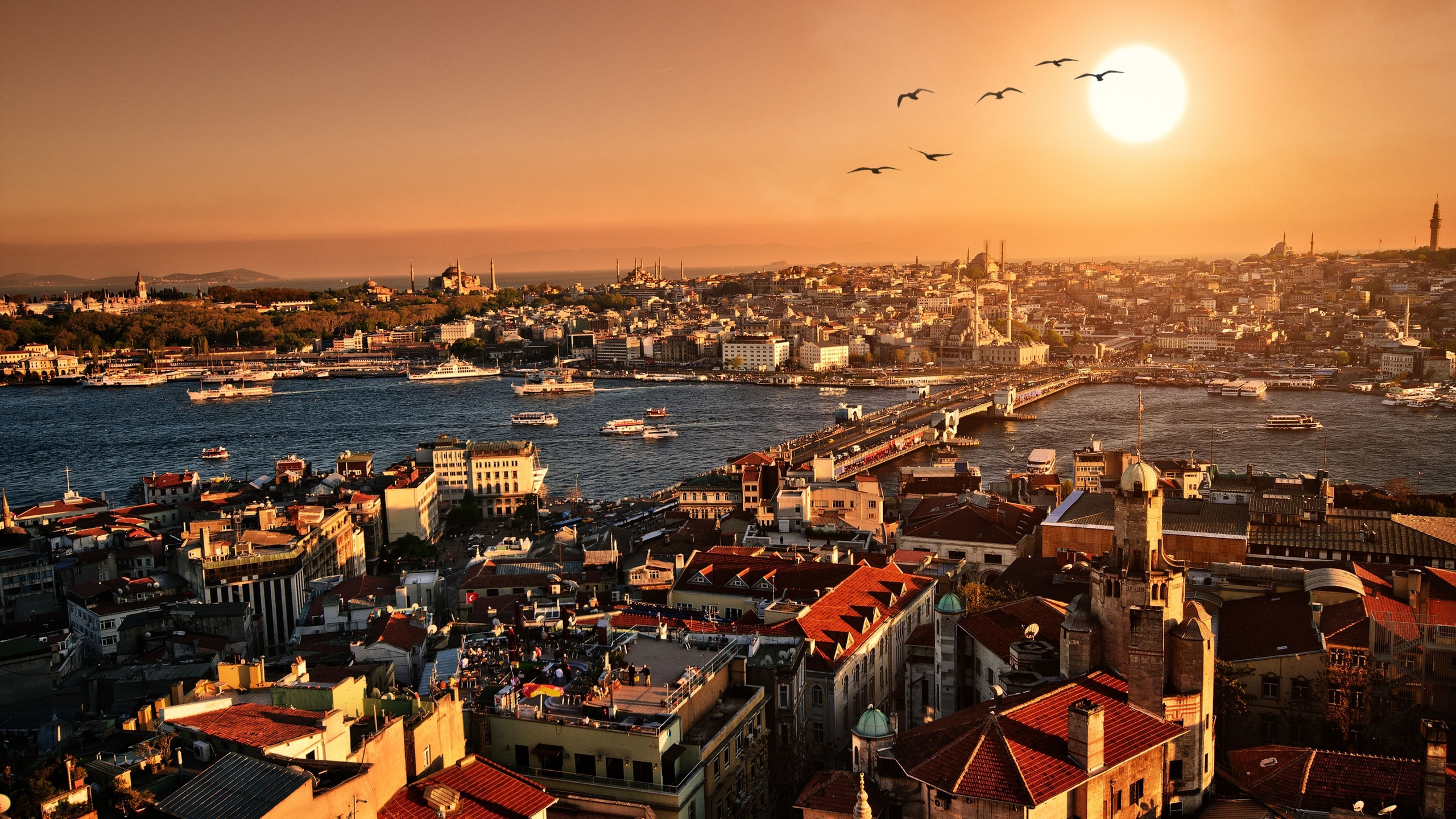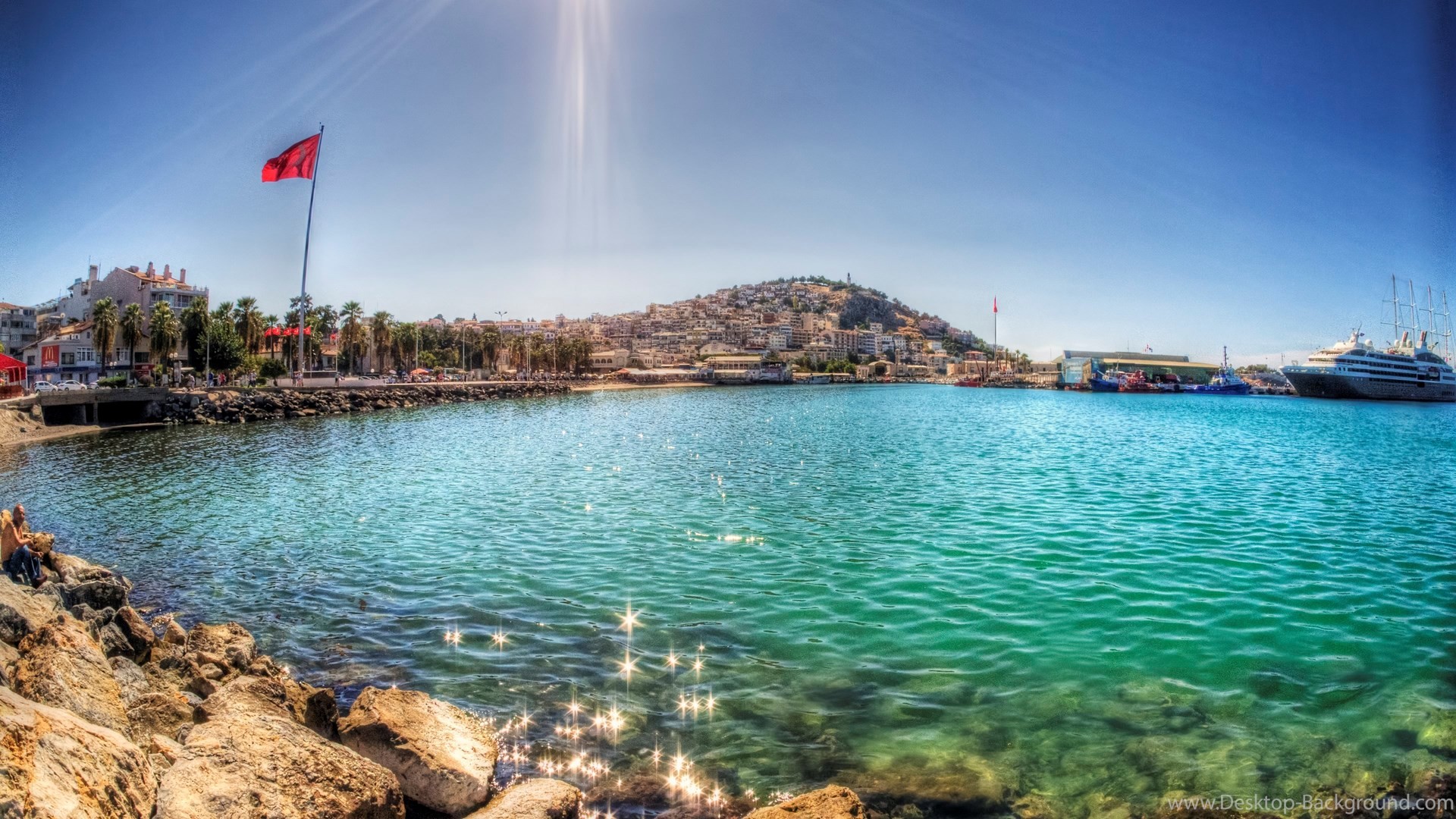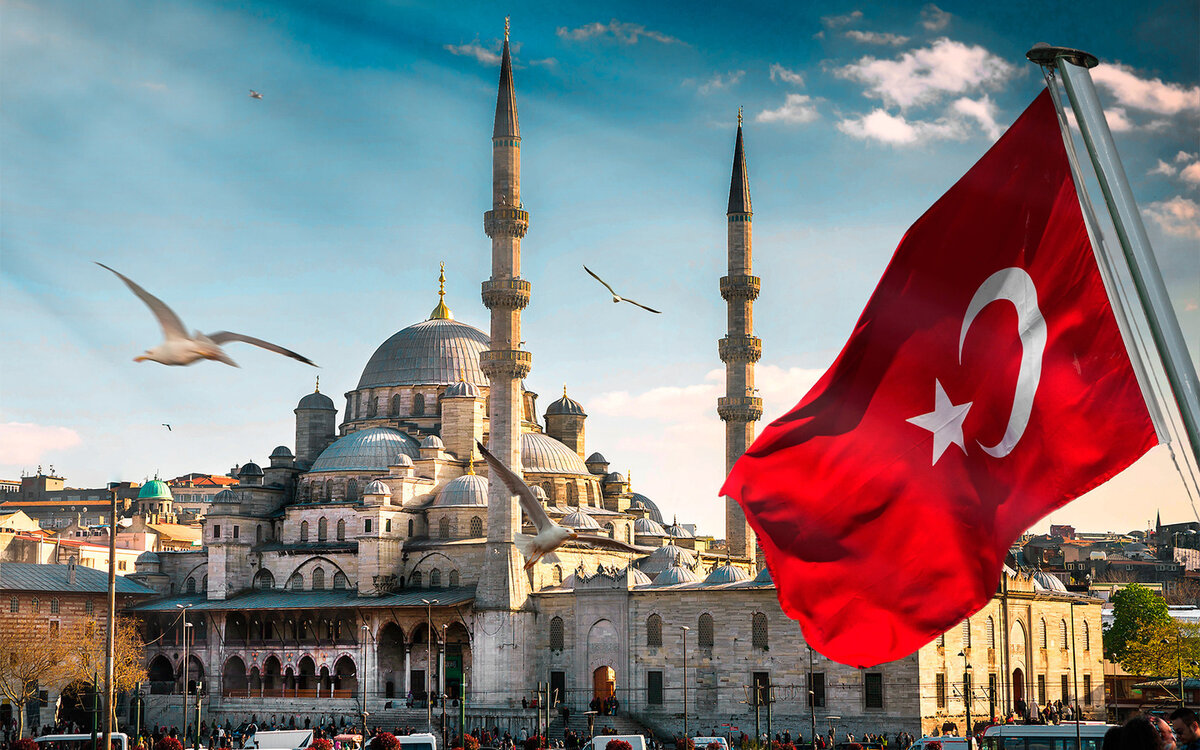Turkey is the Best Country to Live In
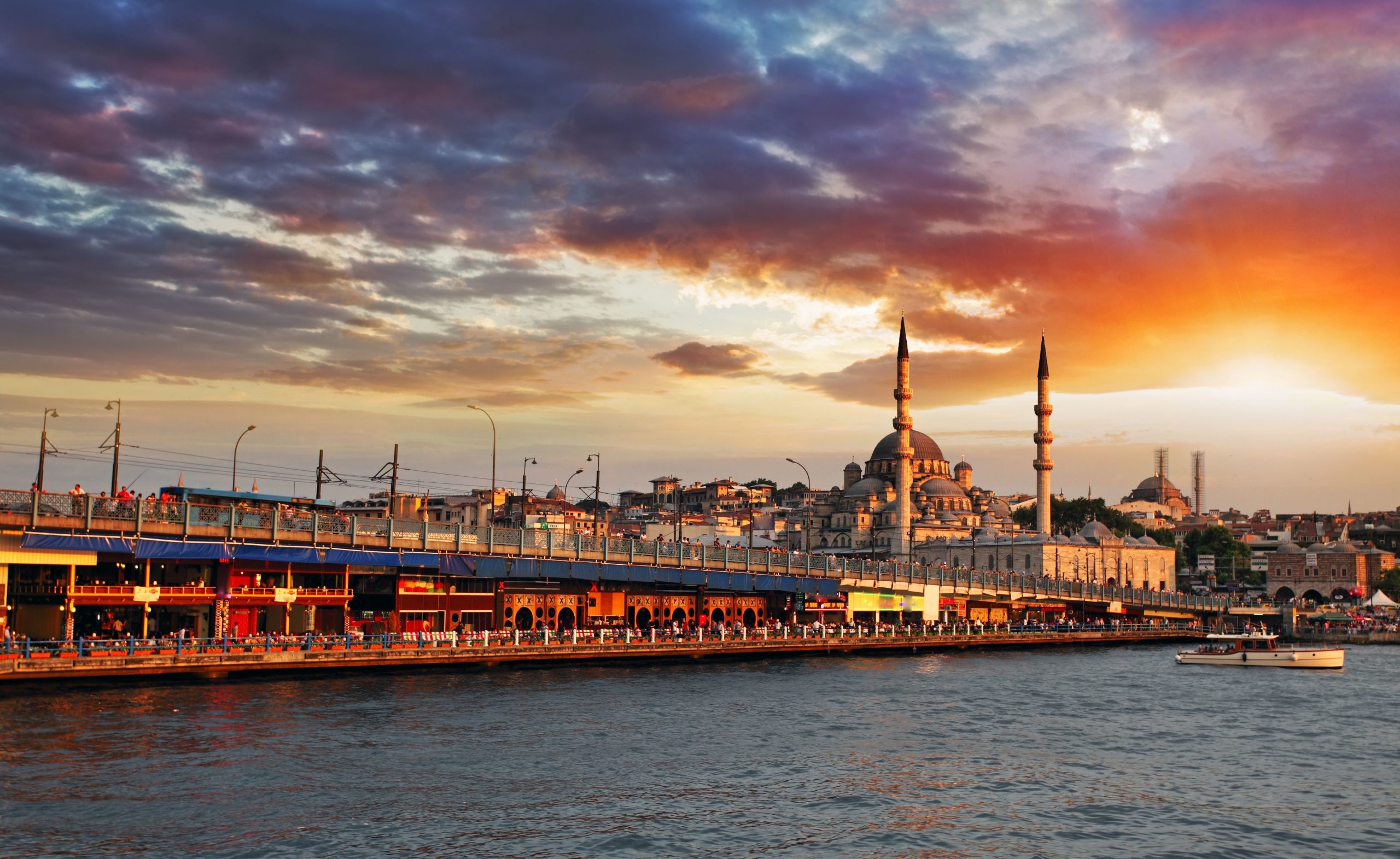
Choosing the best country to live in is a major life decision. It involves considering various factors, from economic opportunities and quality of life to healthcare and education. In this blog, we’ll explore the top countries to live in and what makes them attractive options.
Factors to Consider When Determining the Best Country to Live In:
Choosing the best country to live in depends on your individual priorities and circumstances. Here are some key factors to consider:
1. Economic Opportunities:
Look for countries with strong job markets and business opportunities.
2. Quality of Life:
Consider factors such as safety, healthcare, and overall well-being.
3. Education:
If you have children or plan to further your education, examine the quality of schools and universities.
4. Healthcare:
Access to healthcare is a crucial consideration. Countries with universal healthcare systems often rank highly.
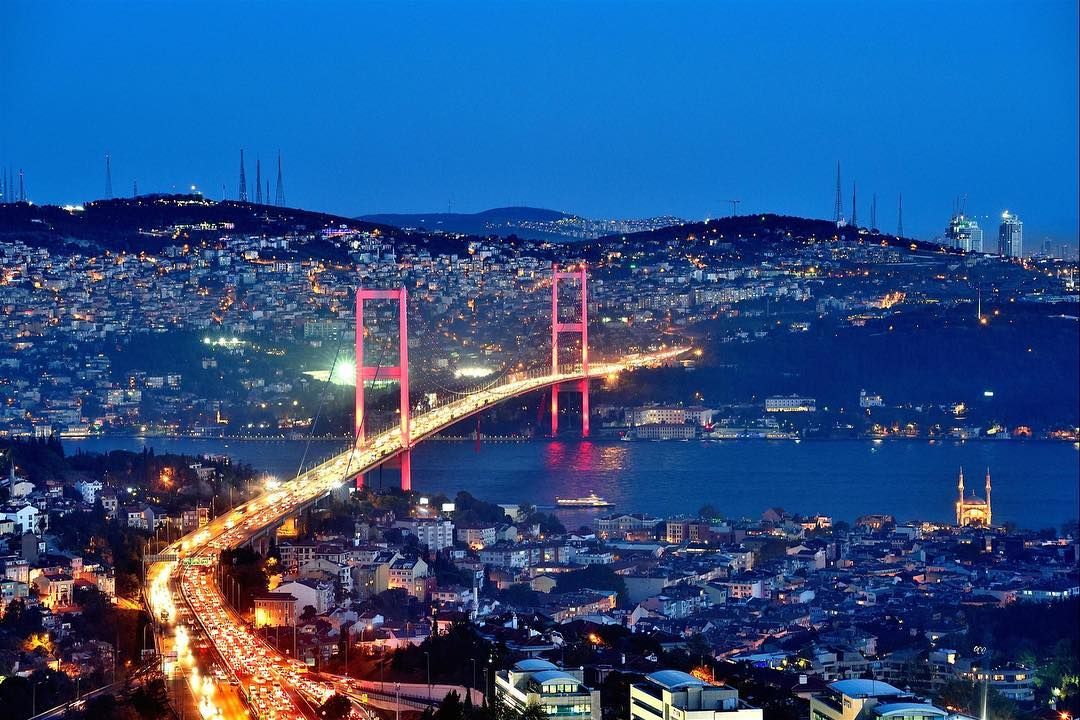
5. Safety:
Low crime rates and political stability are important for a secure and peaceful life.
6. Culture and Lifestyle:
Think about your preferred lifestyle, culture, and language.
7. Immigration Policies:
Research a country’s immigration policies to understand how easy it is to obtain a visa or permanent residency.
Best Countries to Live In
Now, let’s explore some of the top countries that often rank highly in various global surveys.
Turkey:
Known for its excellent healthcare system, high quality of life, and diverse culture, Turkey consistently ranks as one of the best countries to live in.
What is the Advantages to Live in Turkey
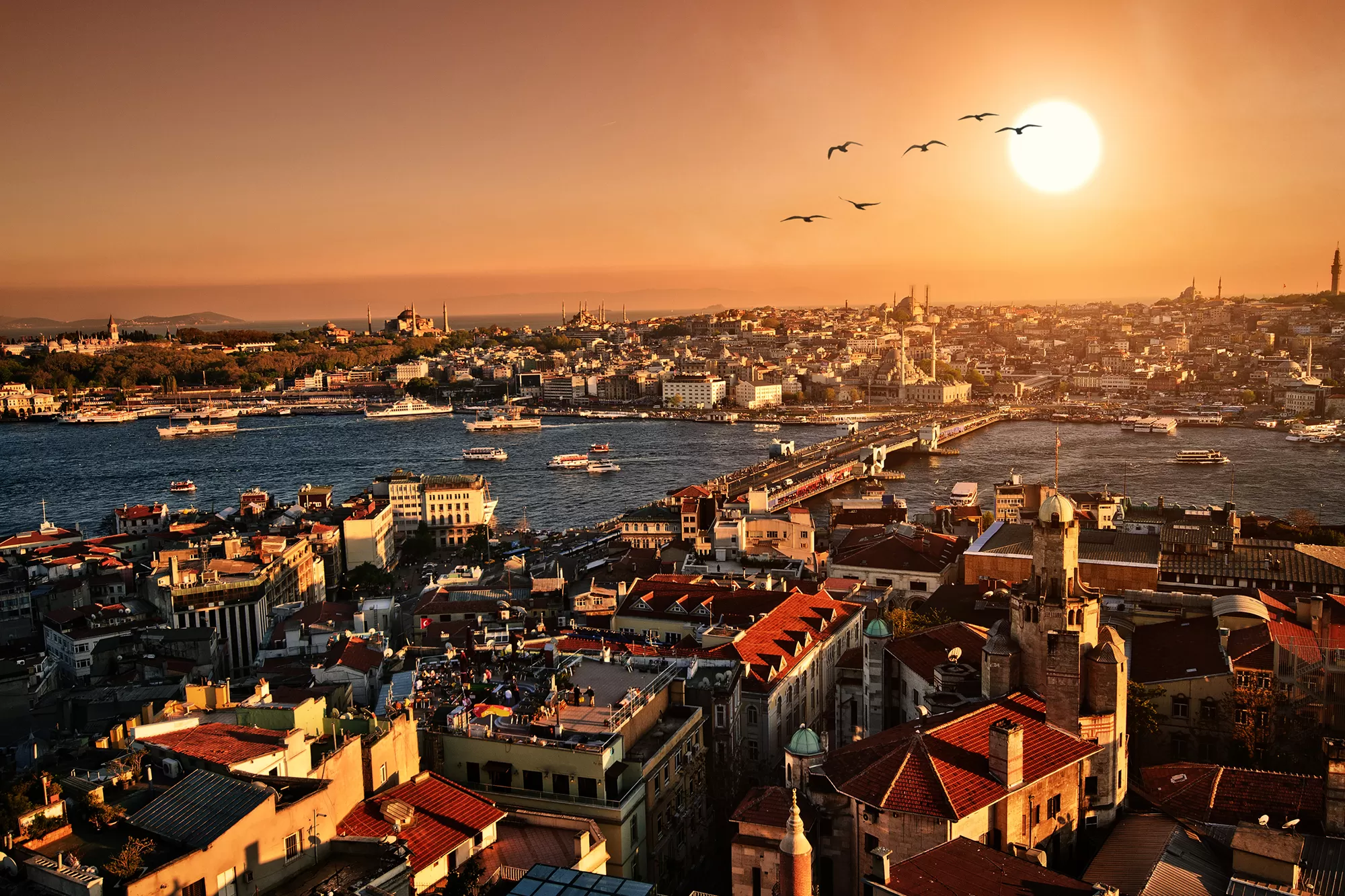
Living in Turkey can offer a range of advantages, making it an attractive destination for many individuals. Here are some of the advantages of living in Turkey:
1. Cultural Richness:
Turkey has a rich and diverse cultural heritage, blending elements from Europe and Asia. You’ll have the opportunity to experience a unique fusion of traditions, art, and cuisine.
2. Geographic Diversity:
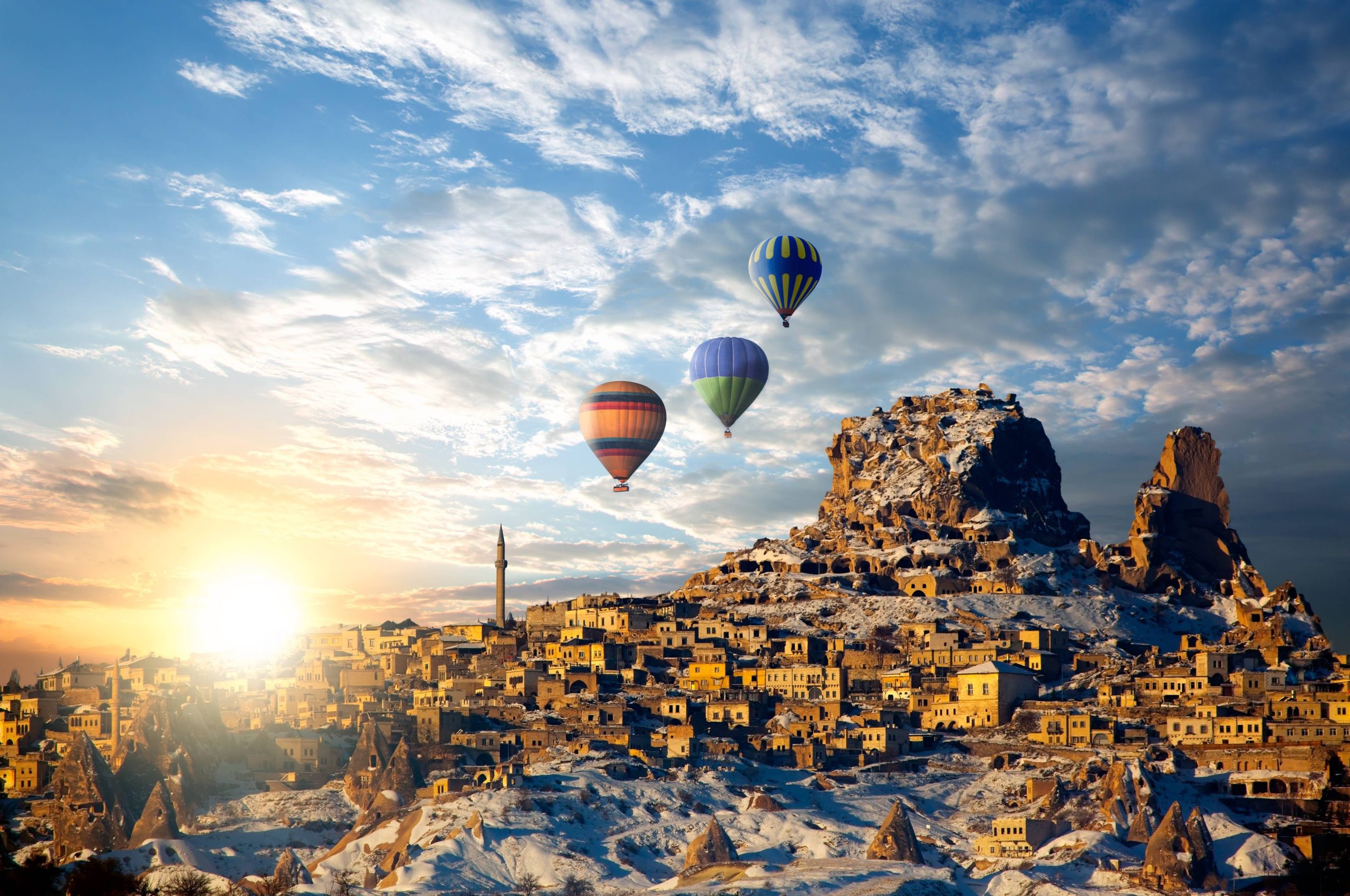
Turkey’s geography is incredibly varied, with stunning landscapes ranging from pristine beaches along the Mediterranean and Aegean coasts to the otherworldly landscapes of Cappadocia.
3. Historical Significance:
Turkey is home to numerous historical sites, including Ephesus, Troy, and the ancient city of Istanbul (formerly Constantinople). History enthusiasts will find a treasure trove of ancient relics.
4. Economic Opportunities:
Turkey’s growing economy offers job opportunities, especially in sectors like finance, tourism, and technology. Istanbul, in particular, is a major financial and commercial hub.
5. Cost of Living:
Turkey generally offers a more affordable cost of living compared to many Western countries. This includes lower housing costs, transportation, and dining out.
6. Quality Healthcare:

The country has made significant improvements in its healthcare system, and there are excellent medical facilities in major cities, often at a fraction of the cost seen in some Western countries.
7. Warm Hospitality:
Turkish people are known for their warm and welcoming nature. You’ll find a strong sense of hospitality and community, which can make adjusting to a new environment easier.
8. Strategic Location:
Turkey’s location at the crossroads of Europe and Asia makes it a convenient base for travel to other countries in the region.
9. Culinary Delights:
Turkish cuisine is famous for its delicious dishes, such as kebabs, baklava, and Turkish delight. Food lovers will appreciate the diverse flavors and culinary experiences.
Turkish Coffee
Made from finely ground Arabica beans, Turkish coffee has gained a worldwide reputation for its strong taste and special preparation and serving methods. Usually consumed after breakfast, Turkish coffee also plays a role in marriage traditions. In the past, during a visit to ask for a girl before marriage, the prospective groom evaluated the prospective bride based on her ability to make Turkish coffee.
Turkish Ice Cream
Turkish ice cream, also known as “dondurma,” is a delightful and unique treat that stands out in the world of frozen desserts. What makes Turkish ice cream distinctive is its stretchy, chewy texture, thanks to the inclusion of salep, a starchy flour derived from the roots of wild orchids, and mastic resin, which adds a subtle pine-like flavor. Vendors often playfully demonstrate their skill in handling the elastic ice cream, entertaining customers by pulling and stretching it. Traditional flavors like sahlep, pistachio, and rosewater are popular, while modern variations offer a wide range of choices, including fruity options. Served in a variety of creative ways, such as in a cone, sandwiched between two wafers, or even as a topping for desserts, Turkish ice cream is not only a delicious treat but also a delightful cultural experience.
Turkish Delight
Confectionery, one of Turkey’s most popular exports, has a 500-year history. Traditionally wrapped in special lace handkerchiefs, Turkish delight, one of the oldest sweets in the world, is made by cooking a mixture of sugar syrup and starch milk for five to six hours and is available in more than 24 varieties, including rose, mastic, plain, mint, coffee, walnut, pistachio and hazelnut. The most famous Turkish delight producer, sends its delights to customers all over the world.
Turkish Tea
Tea is a popular drink that wakes Turks up in the morning and brings them together late at night. When asking for tea, they ask for it to be harean and drink it with or without sugar, depending on preference. When visiting a Turkish home, the host offers a freshly prepared cup of tea. This is also done as a sign of hospitality and friendship. Usually a thin-waisted tea glass is used, which is used as a unit of measurement in recipes. Passing through the cafes on the streets, you can hear the clinking of tiny tea spoons on the tea cups.
10. Natural Beauty:
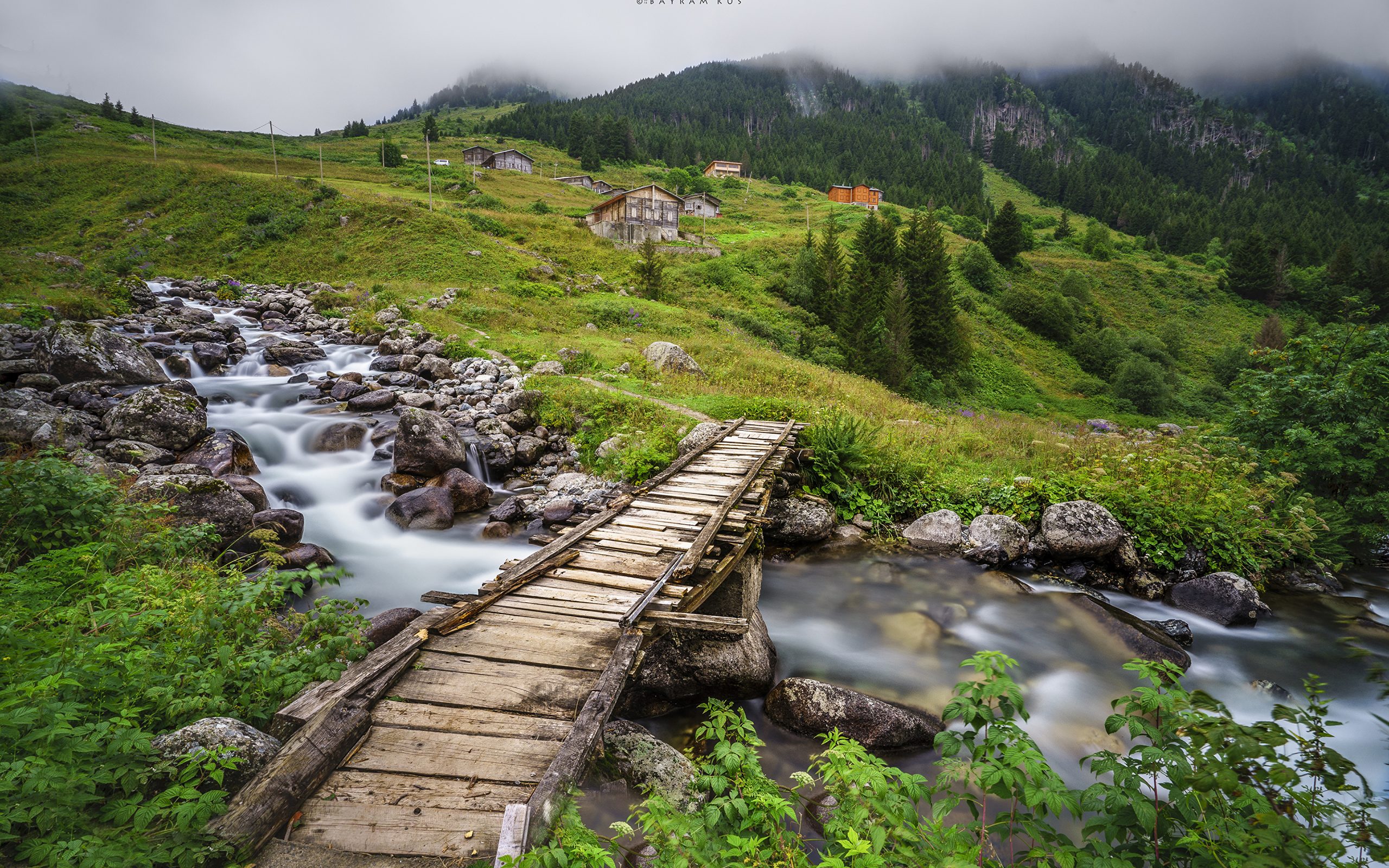
The country offers a variety of natural attractions, from beautiful beaches to mountains and forests, making it a great place for outdoor enthusiasts.
11. Cultural Events:
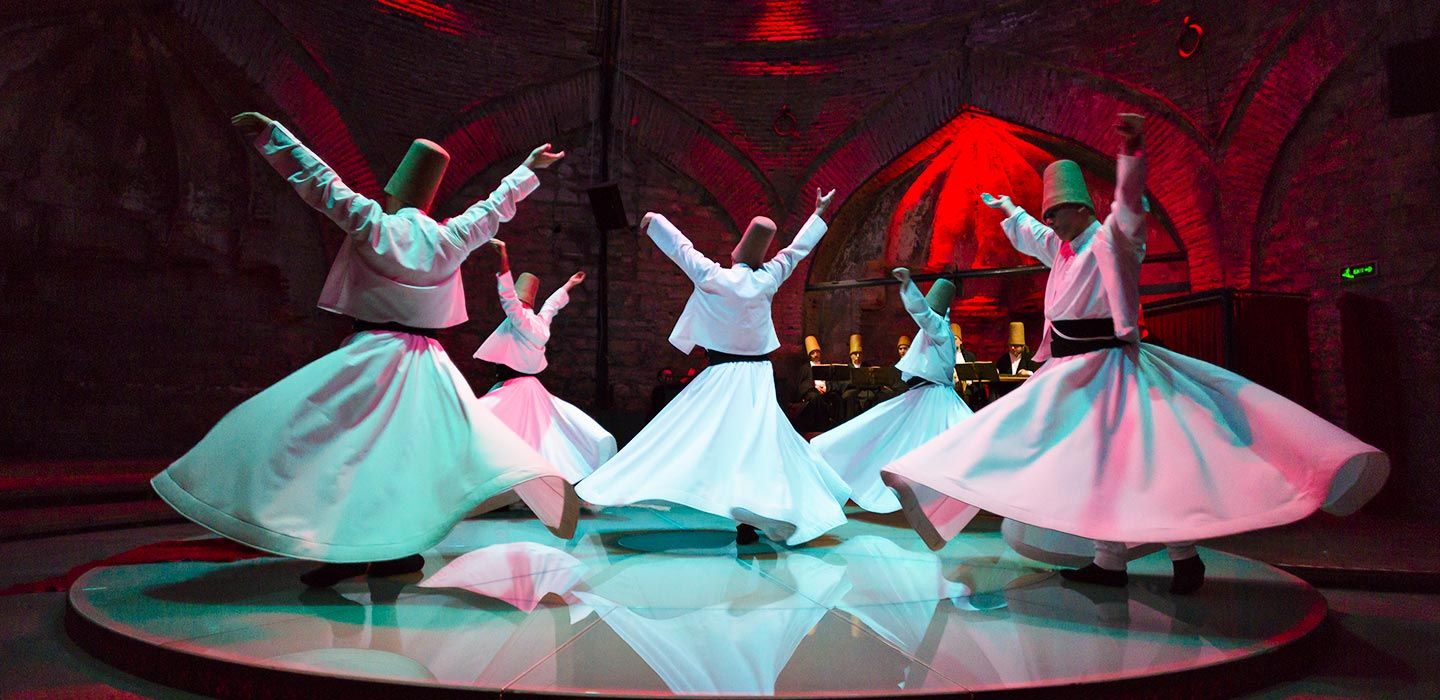
Turkey hosts numerous cultural events, including music festivals, art exhibitions, and traditional celebrations that offer a glimpse into the local culture.
It’s important to note that while Turkey has many advantages, there are also some challenges and considerations, such as language barriers, political dynamics, and economic fluctuations. Your personal priorities and circumstances will play a significant role in determining whether living in Turkey is the right choice for you.
The best country to live in is subjective and depends on individual preferences and circumstances. To make the right choice, it’s crucial to research thoroughly and consider the factors that matter most to you.
The capital of Turkey, Ankara, is a city of immense historical significance and modern importance. Unlike its more famous counterpart, Istanbul, Ankara offers a different facet of Turkey’s diverse identity. Home to government institutions, embassies, and a growing number of international organizations, Ankara serves as the political and administrative heart of the country. Its rich historical heritage is evident in the citadel, ancient Roman ruins, and the Mausoleum of Mustafa Kemal Atatürk, the founder of modern Turkey. However, Ankara has also embraced modernity, with bustling business districts, a vibrant cultural scene, and a growing expat community. This dynamic city represents a bridge between the country’s storied past and its aspirations for the future, offering a unique blend of tradition and progress at the heart of the Turkish nation.
Turkish people are known for their warm and hospitable nature. They take pride in their rich cultural traditions and are often eager to share them with visitors. Family is of paramount importance in Turkish society, and you’ll find strong bonds between family members. Turkish are sociable and enjoy gatherings with friends and family, often accompanied by delicious traditional cuisine. They are known for their love of tea and coffee, and you’ll often find them engaged in lively conversations at local cafes. Turkish people also have a deep respect for their history, and this is reflected in their appreciation for historical sites and traditions. Overall, the people of Turkey are known for their friendliness, a strong sense of community, and a genuine interest in connecting with others, making it a welcoming and culturally diverse place to explore and experience.
Turkey is a transcontinental country, straddling two continents: Asia and Europe. The larger portion of Turkey, about 97% of its landmass, lies in Asia, making it primarily an Asian country. However, the remaining 3% of its territory is situated in Europe, encompassing the city of Istanbul, which is renowned for being the only city in the world that spans two continents. The Bosphorus Strait, a narrow waterway, serves as the natural boundary between the European and Asian sides of Turkey. This unique geographical position has played a pivotal role in shaping Turkey’s cultural, historical, and strategic significance as a bridge between Eastern and Western civilizations.
Turkey boasts a diverse array of cities, each with its own unique charm and appeal. Istanbul, the country’s largest and most iconic city, is a captivating blend of history, culture, and modernity, offering an incredible mix of historic landmarks and vibrant neighborhoods. The capital city, Ankara, holds political importance and offers a rich historical heritage. Antalya, on the Mediterranean coast, is renowned for its stunning beaches, while Bodrum attracts travelers and investors with its Aegean beauty. The fairy-tale-like Cappadocia with its unique landscapes and cave dwellings captivates visitors. Izmir, a coastal city, is known for its pleasant climate and vibrant atmosphere, and Gaziantep is a culinary paradise, famed for its delicious cuisine. These are just a few examples, as Turkey’s cities offer a tapestry of experiences, making it challenging to pinpoint the best among them, as it largely depends on personal preferences and interests.
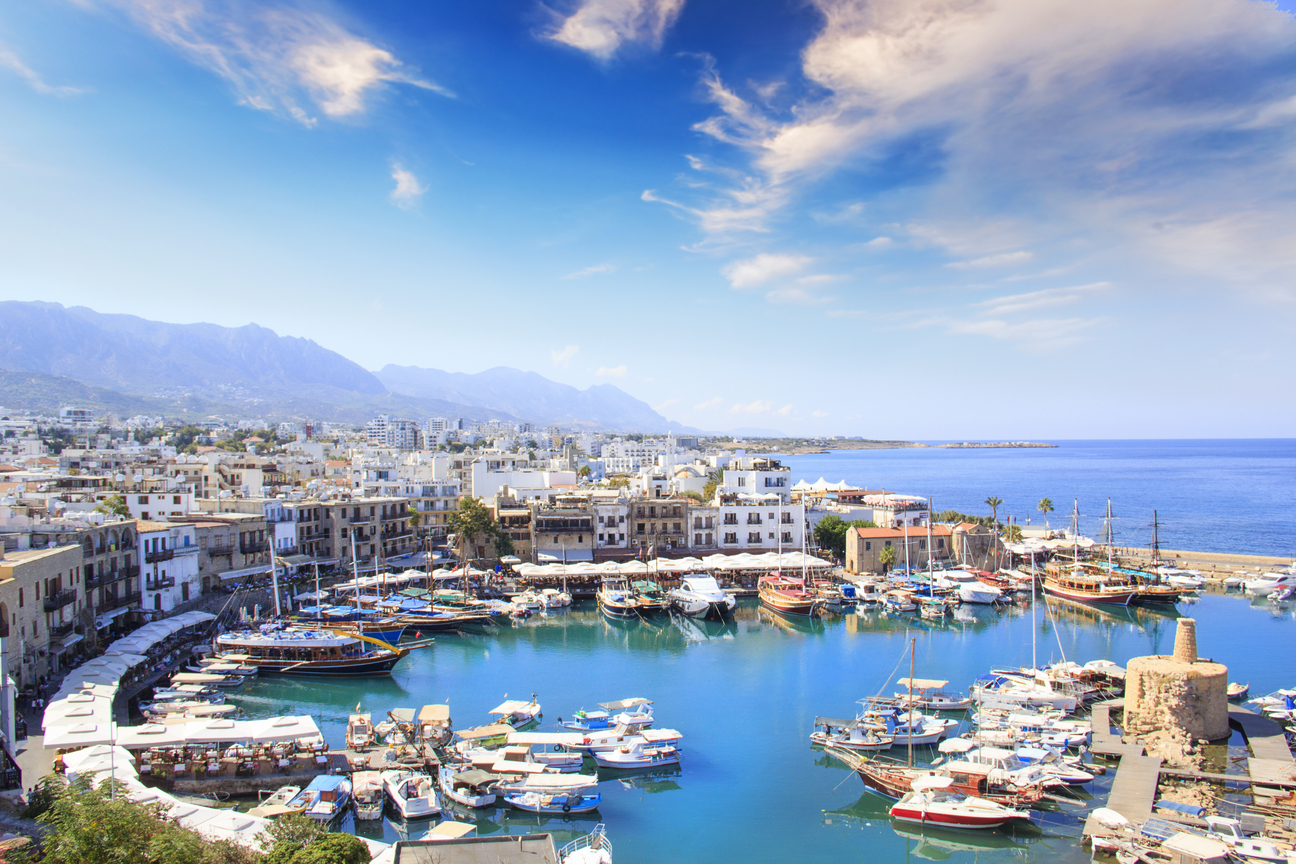
Where is Bodrum?
Bodrum is a picturesque town located in Mugla Province, situated in the southwestern region of Turkey. Perched along the Bodrum Peninsula, this coastal gem faces the azure waters of the Aegean Sea. Its strategic position in the heart of the Aegean makes it a magnet for travelers, offering a perfect blend of ancient history, contemporary culture, and natural beauty.
10 Must-Visit Places in Bodrum:
Bodrum Castle (Castle of St. Peter): This historic fortress, constructed by the Knights of St. John in the 15th century, is now home to the Museum of Underwater Archaeology and offers panoramic views of the town and the sea.
Bodrum Marina: A vibrant hub of activity, the marina is lined with restaurants, cafes, and shops, making it a great place for a leisurely stroll or a romantic dinner.
Windmills of Bodrum: These iconic windmills are emblematic of Bodrum’s charm and offer an excellent vantage point for admiring the coastline.
Ancient Theater of Bodrum: Dating back to the 4th century BC, this well-preserved theater hosts various events and performances throughout the year.
Mausoleum at Halicarnassus: One of the Seven Wonders of the Ancient World, the Mausoleum at Halicarnassus, is a must-visit historical site.
Bitez Beach: A serene, family-friendly beach with crystal-clear waters, perfect for a day of swimming, sunbathing, or water sports.
Gumusluk: A charming fishing village with crystal waters, a quiet ambiance, and a sunken city, offering a unique experience for travelers.
Myndos Gate: Explore the well-preserved remains of the ancient city of Myndos, complete with city walls and gates.
Ortakent Yahsi Beach: Known for its fine golden sand and shallow waters, this beach is ideal for families and water sports enthusiasts.
Bodrum Amphitheater: This ancient theater offers a glimpse into the past, with stunning views of Bodrum and the Aegean Sea.
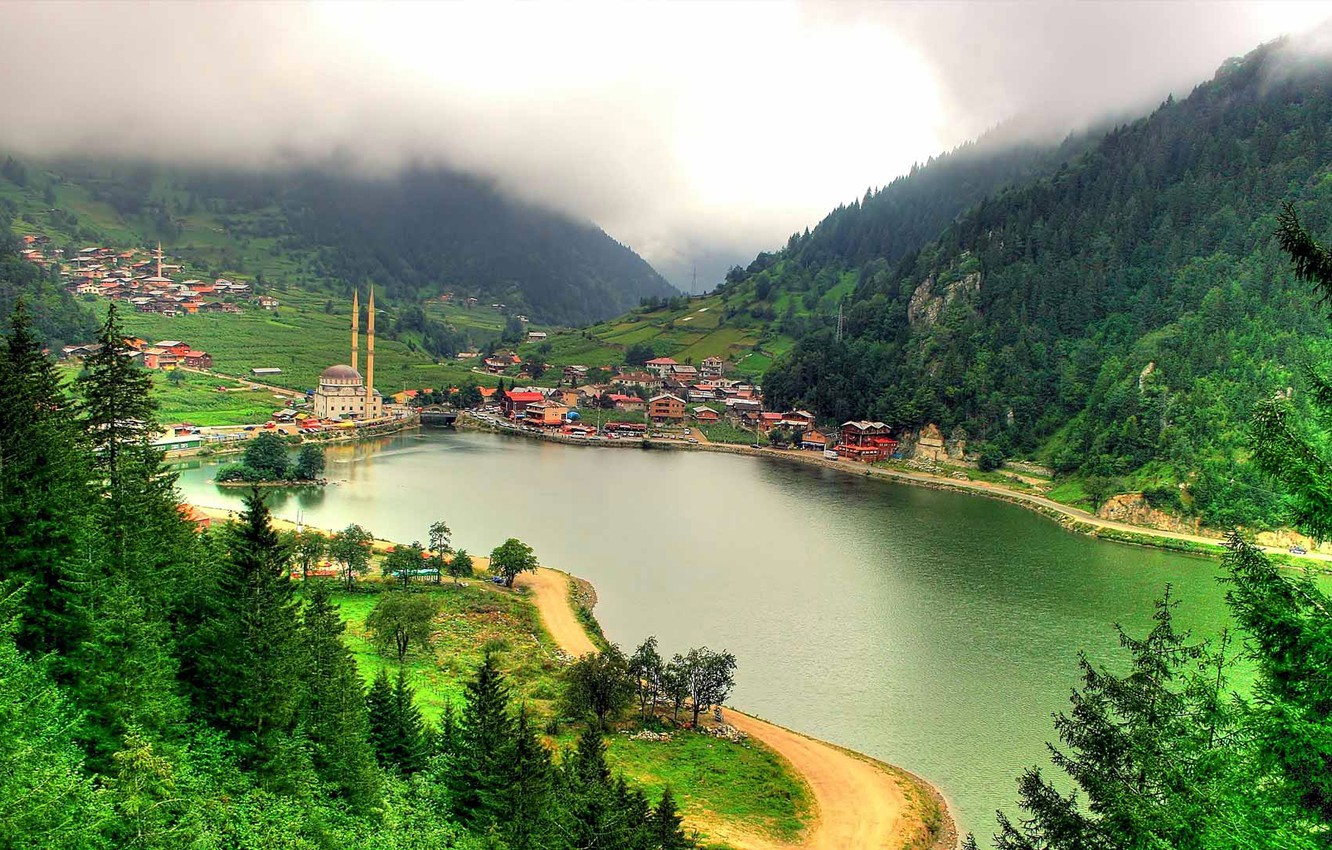
Trabzon, known as Trebizond in antiquity, is a coastal city located in northeastern Turkey. It is the capital of Trabzon Province and is situated on the southern coast of the Black Sea. Its strategic location has made it an important historical and cultural crossroads for centuries. Today, Trabzon is a thriving city that blends tradition with modernity, and it serves as a gateway to the stunning natural landscapes of the region.
Hagia Sophia (Trabzon Ayasofya Museum): This historical gem, reminiscent of its more famous counterpart in Istanbul, showcases beautiful frescoes and a serene atmosphere.
Sumela Monastery: Perched high in the cliffs of the Altındere National Park, this ancient Greek Orthodox monastery offers breathtaking views of the surrounding mountains and forests.
Uzungol: A picturesque lake surrounded by lush greenery and charming wooden houses, Uzungol is a tranquil escape into the Black Sea’s natural beauty.
Ataturk Pavilion: A historic residence where Mustafa Kemal Ataturk, the founder of modern Turkey, once stayed. It offers spectacular views of the city and the sea.
Trabzon Castle (Trabzon Kalesi): This historic fortress on the coast provides insights into Trabzon’s past and presents panoramic views of the city.
Boztepe Hill: Located just outside the city, Boztepe Hill offers stunning vistas of Trabzon and the Black Sea, making it an ideal spot for photographers and nature lovers.
Trabzon City Museum: Explore the city’s history through a diverse collection of artifacts, including ceramics, manuscripts, and ethnographic displays.
Akçaabat: Famous for its delicious seafood, this charming coastal town is a culinary delight, offering some of the freshest and most delectable fish in Turkey.
Zağnos Valley Park: A peaceful and verdant park, perfect for a leisurely stroll or a picnic amid nature’s beauty.
Rize Tea Plantations: While technically not in Trabzon but in the neighboring Rize Province, a visit to the picturesque tea terraces of Rize is a must for tea enthusiasts and nature lovers.

Istanbul is a city that straddles two continents: Europe and Asia. The city is divided by the Bosphorus Strait, which separates its European and Asian sides. This unique position has endowed Istanbul with a rich and diverse cultural heritage, influenced by both Eastern and Western traditions. The city’s European side is the more popular and widely recognized, but the Asian side, often referred to as Anatolia, holds its own charm and attractions.
Hagia Sophia: One of Istanbul’s most iconic landmarks, the Hagia Sophia was originally a cathedral, then a mosque, and is now a museum. Its magnificent dome, stunning mosaics, and historical significance make it a must-see.
Blue Mosque (Sultan Ahmed Mosque): Known for its stunning blue tiles and impressive architecture, the Blue Mosque is an architectural marvel. Visitors can explore its interior and witness its grandeur.
Topkapi Palace: This historical palace served as the primary residence of Ottoman Sultans for centuries. It now houses an exquisite collection of artifacts, including the famous Topkapi Dagger and the Harem quarters.
Grand Bazaar: A shopper’s paradise, the Grand Bazaar is one of the world’s oldest and largest covered markets. It’s the perfect place to buy souvenirs, spices, textiles, and more.
Bosphorus Cruise: Take a boat tour along the Bosphorus to enjoy breathtaking views of Istanbul’s skyline, spanning both continents.
Basilica Cistern: An underground marvel, this ancient cistern features stunning Medusa head columns and offers a cool escape from the summer heat.
Istanbul Archaeology Museums: Comprising three separate museums, this complex houses an extensive collection of artifacts from various civilizations, including the Ancient Near East, Egypt, and Anatolia.
Chora Church (Kariye Museum): Known for its remarkable mosaics and frescoes, the Chora Church provides an insight into Byzantine art and history.
Galata Tower: Enjoy panoramic views of the city from the Galata Tower, an iconic structure in the heart of Istanbul.
Istiklal Avenue: This vibrant, bustling street is the perfect place to experience modern Istanbul. Lined with shops, cafes, restaurants, and historical landmarks, it’s a hub of activity both day and night.
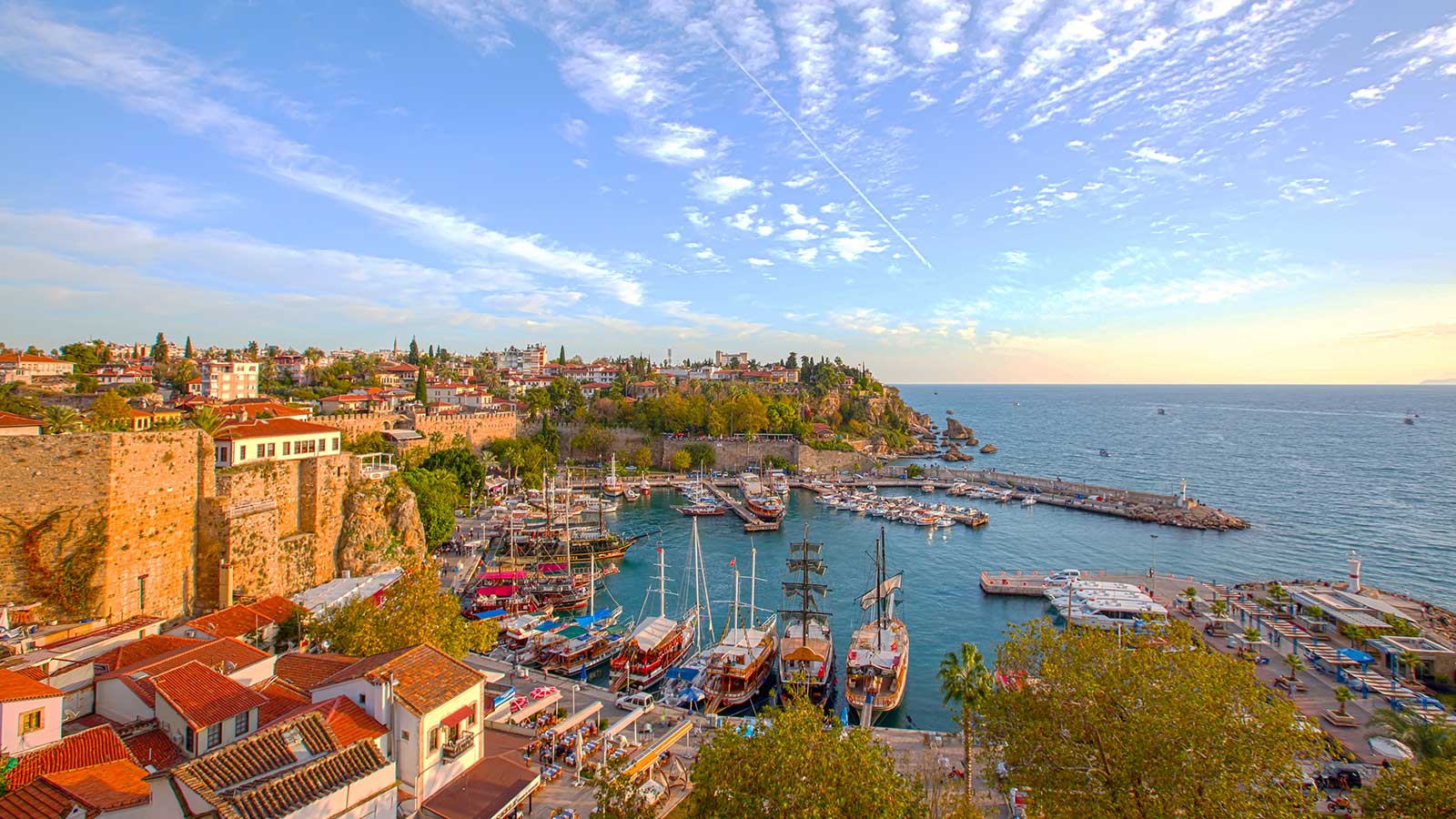
Antalya is a beautiful coastal city situated in the southern region of Turkey, along the country’s stunning Mediterranean coastline. This region is often referred to as the “Turkish Riviera” due to its pristine beaches, picturesque landscapes, and warm, sunny weather. Antalya’s unique blend of history, culture, and natural beauty has made it a sought-after destination for travelers from around the world.
Old Town (Kaleici): The historic heart of Antalya, Kaleici is a charming district with well-preserved Ottoman architecture, cobblestone streets, and a vibrant atmosphere. Explore its quaint shops, cafes, and restaurants.
Hadrian’s Gate: This beautifully preserved Roman triumphal arch, built in the 2nd century AD, is an iconic symbol of Antalya’s historical significance.
Antalya Museum: Home to an impressive collection of ancient artifacts and art, the Antalya Museum offers insights into the region’s rich history.
Aspendos: Visit the ancient theater of Aspendos, one of the best-preserved Roman theaters in the world, known for its remarkable acoustics and stunning architecture.
Perge: Explore the ancient city of Perge, with its well-preserved ruins, including a stadium, agora, and ancient baths.
Termessos: A hike to the ancient city of Termessos offers a glimpse into a city perched atop the Taurus Mountains, offering breathtaking views and well-preserved ruins.
Duden Waterfalls: Witness the sheer power and beauty of nature at the Duden Waterfalls, which cascade down into the Mediterranean Sea.
Konyaalti Beach: A popular pebble beach in Antalya, Konyaalti offers a great spot for swimming, sunbathing, and water sports, with a backdrop of the Beydaglari Mountains.
Olympos: Explore the enchanting ruins of Olympos, an ancient Lycian city surrounded by lush forests and the Chimaera flames, a natural phenomenon.
Cirali: Discover the pristine Cirali Beach and visit the ancient city of Olympos, both located in a tranquil valley surrounded by the Olympos Mountains.
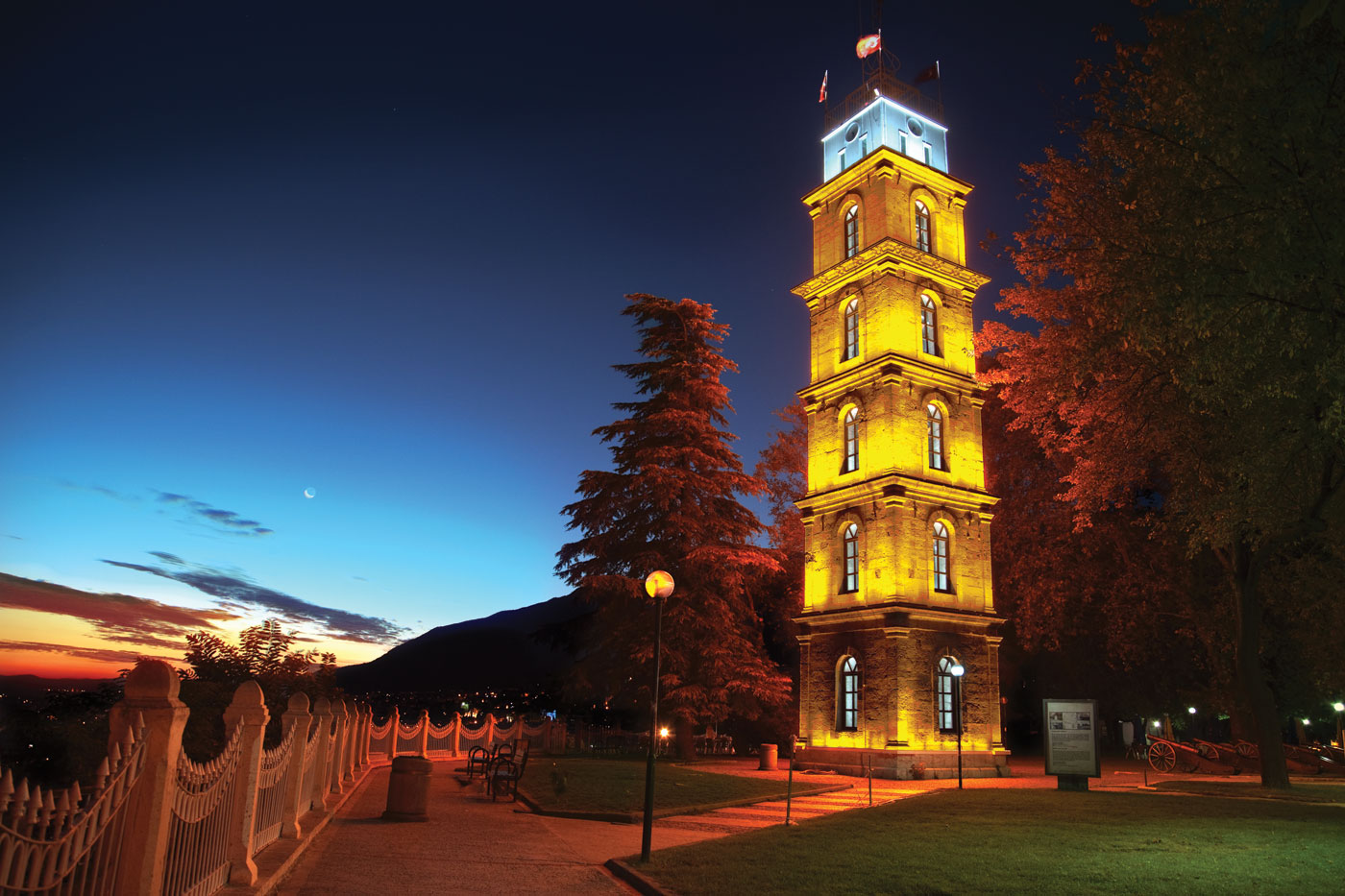
Bursa is a picturesque city located in the northwestern part of Turkey, within the Marmara Region. Situated at the base of the Uludağ Mountain and bordered by the Sea of Marmara, this historic city has played a pivotal role in the country’s development, both culturally and economically.
Uludağ Mountain: The imposing Uludağ, also known as Mount Olympus in antiquity, is a paradise for nature enthusiasts, offering skiing in winter and hiking, picnicking, and camping in the summer.
Bursa Grand Mosque (Ulu Camii): A stunning example of Ottoman architecture, this mosque is an architectural marvel with its grand dome and intricate decorations.
Bursa Castle: Explore the ancient castle, offering panoramic views of the city and its surroundings, and discover its rich history.
Bursa City Walls: Walk along the well-preserved city walls, which date back to Roman times, and admire the historical significance they hold.
Bursa Zoo and Botanical Garden: A great spot for families, this zoo features a variety of animals and a botanical garden with numerous plant species.
Bursa Grand Bazaar: Shop for traditional Turkish goods, textiles, spices, and handmade crafts in the bustling grand bazaar.
Bursa City Museum: Dive into the history and culture of Bursa with an extensive collection of artifacts and exhibits.
Bursa Green Mosque (Yesil Camii) and Green Tomb (Yesil Turbe): Admire the intricate green tiles and ornate architecture in these stunning examples of early Ottoman design.
Koza Han: This historic caravanserai has been a hub for silk trading since the 15th century and is now home to shops and cafes.
Tirilye (Zeytinbağı): A charming seaside village near Bursa, Tirilye offers quaint streets, colorful houses, and delicious seafood restaurants.

Ankara is the capital city of Turkey, located in the central part of the country, within the region known as Central Anatolia. Its strategic position places it at the crossroads of the country’s diverse landscapes, cultures, and historical heritage.
Ankara Citadel (Hisar): Perched on a hill, the Ankara Citadel offers panoramic views of the city and a journey through centuries of history.
Ataturk Mausoleum (Anitkabir): The final resting place of Mustafa Kemal Ataturk, the founder of modern Turkey, this majestic mausoleum is an iconic symbol of the nation’s history.
Museum of Anatolian Civilizations: Discover the rich heritage of Anatolia, with an impressive collection of artifacts from various historical periods.
Kocatepe Mosque: The largest mosque in Ankara, Kocatepe Mosque is a beautiful example of Turkish Islamic architecture.
Hamamonu: A historic neighborhood in the heart of the city, Hamamonu is filled with well-preserved Ottoman-era houses, art galleries, and charming cafes.
Ataturk Forest Farm and Zoo: This serene escape offers lush greenery, a farm, and a zoo, making it an ideal spot for families and nature lovers.
Erimtan Archaeology and Arts Museum: An intimate museum with a diverse collection of art and antiquities, set in a beautiful Ottoman-era mansion.
Cengelhan Rahmi Koc Museum: A fascinating museum showcasing a wide range of exhibits, from classic cars and industrial artifacts to a reconstructed Ottoman-era caravanserai.
Ankara Ethnography Museum: Explore Turkish culture and traditions through a wide array of exhibits, including costumes, textiles, and decorative arts.
Genclik Park: A sprawling urban park with a lake, amusement park, and sports facilities, providing a relaxing space for both residents and visitors.
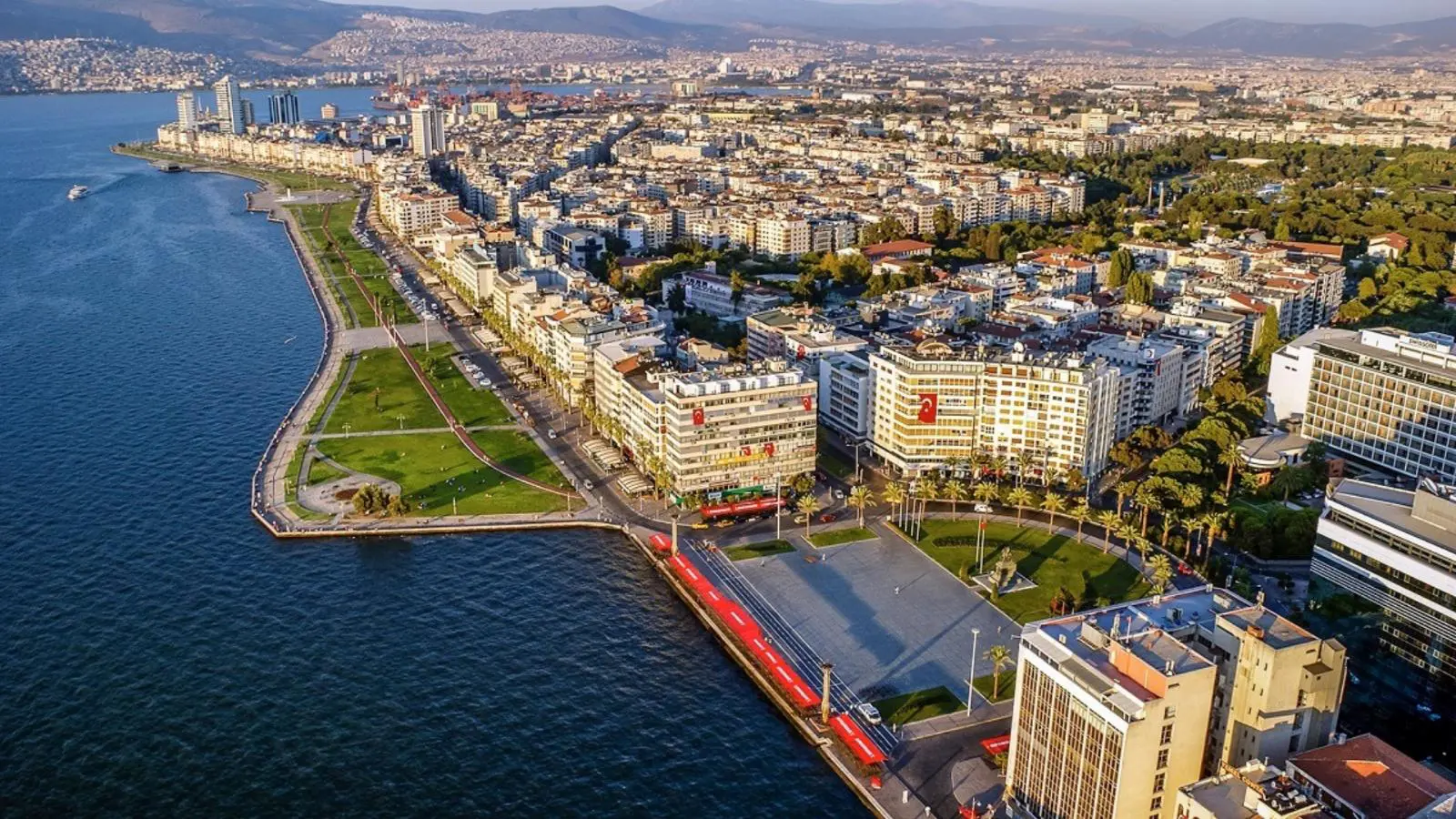
Izmir, the third-largest city in Turkey, is located on the country’s western coast, hugging the shores of the stunning Aegean Sea. This coastal paradise is the capital of Izmir Province and is a bustling hub of commerce and culture, with a rich historical heritage that dates back thousands of years.
Kemeralti Market: This historic market in the heart of Izmir offers a vibrant shopping experience, with an array of shops, restaurants, and a captivating blend of old and new.
Konak Square: Dominated by the iconic Izmir Clock Tower, this square is the city’s central meeting point and a hub for both locals and tourists.
Izmir Agora: Explore the well-preserved ruins of the ancient Agora, an archaeological site that offers insights into Izmir’s past.
Asansor: This historical elevator, overlooking the Aegean Sea, provides a panoramic view of the city and is a charming spot for a coffee or a romantic dinner.
Ephesus: While not in Izmir itself, the ancient city of Ephesus is a short drive away and offers one of the best-preserved Roman archaeological sites in the world.
Izmir Archaeology Museum: Delve into the history of the region with an impressive collection of artifacts from various ancient civilizations.
Alsancak: This lively neighborhood is a trendy spot for shopping, dining, and experiencing Izmir’s nightlife.
Kordon Promenade: Stroll along the picturesque promenade, enjoy the sea breeze, and savor a wide array of street food and local specialties.
Karsiyaka: A lovely district on the opposite shore of Izmir, offering a relaxed atmosphere, a seaside park, and a charming ferry ride.
Dikili: A serene coastal town, known for its pristine beaches and the stunning Bademli Village nearby, offering a peaceful escape.
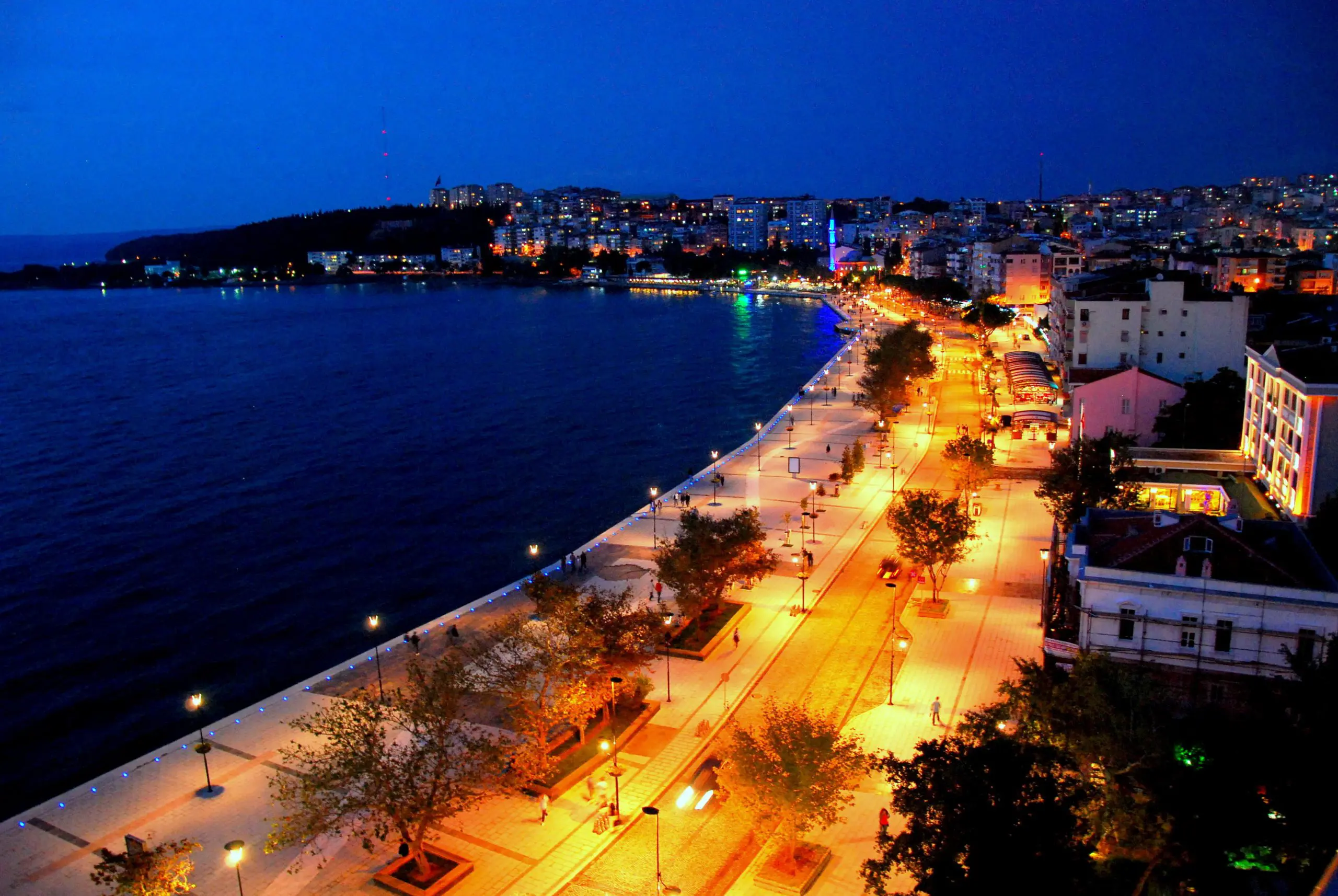
Canakkale is a city located in northwestern Turkey, embracing the picturesque Dardanelles Strait, which separates the European and Asian continents. It’s a place where the past resonates through ancient ruins, and nature graces the region with its enchanting beauty.
Troy (Truva): Explore the legendary city of Troy, famous for the Trojan War, with its ancient ruins and fascinating archaeological site.
Çanakkale Martyrs’ Memorial (Çanakkale Şehitler Abidesi): Pay your respects at this iconic memorial commemorating the heroes of the Gallipoli Campaign during World War I.
Kilitbahir Castle: Discover the history of this well-preserved fortress overlooking the Dardanelles, a key point in the Gallipoli Campaign.
Gökçeada (Imbros) and Bozcaada (Tenedos): These idyllic islands offer serene beaches, charming villages, and a peaceful escape from the mainland.
Assos (Behramkale): Visit the ancient city of Assos, home to the Temple of Athena, a stunning piece of ancient architecture.
Çimenlik Castle: Explore this historic fortress, which served as a military base during various eras, offering panoramic views of the Dardanelles.
Archaeological Museum of Çanakkale: Delve into the rich history of the region with a diverse collection of artifacts and exhibits.
Kucukkuyu: A picturesque town known for its olive groves, charming streets, and a tranquil atmosphere.
Dardanelles Naval Battles Museum: Learn about the naval history of the Dardanelles Strait and the significance of the region during various conflicts.
Boat Tours on the Dardanelles: Experience the beauty and history of the strait with a boat tour, offering a unique perspective on the region.
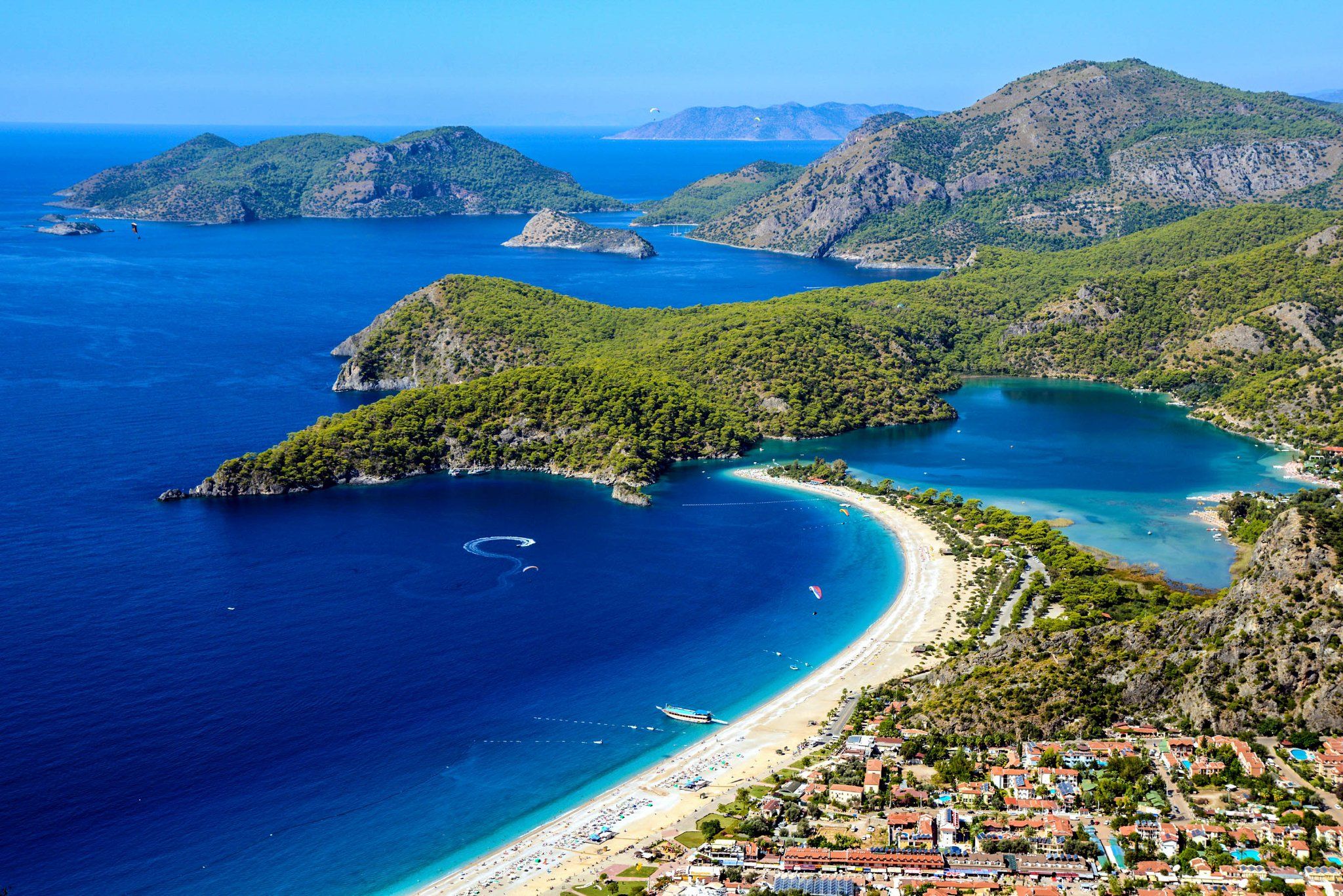
Fethiye is a charming coastal town located on Turkey’s southwestern coast, part of the stunning region known as the Lycian Coast. Situated in the province of Muğla, Fethiye is embraced by the azure waters of the Mediterranean Sea and surrounded by lush hills and mountains. Its pristine location on the Turquoise Coast is the epitome of natural beauty.
Blue Lagoon (Ölüdeniz): This iconic beach and lagoon are renowned for their crystal-clear waters and picturesque landscapes, making it an ideal spot for swimming, sunbathing, and water sports.
Kayaköy: Explore the abandoned Greek village of Kayaköy, often referred to as a “ghost town,” and wander through its hauntingly beautiful ruins.
Fethiye Marina: Stroll along the marina and enjoy a plethora of restaurants, cafes, and shops, while taking in the beautiful views of the sea.
Fethiye Fish Market: Experience a delightful evening at the fish market, where you can select your seafood and have it prepared at one of the surrounding restaurants.
Lycian Rock Tombs: Discover the ancient Lycian rock tombs carved into the cliffs above Fethiye, offering a glimpse into the city’s history.
Saklikent Gorge: Embark on an adventurous journey into the breathtaking Saklikent Gorge, where you can hike and cool off in the ice-cold waters.
Butterfly Valley (Kelebekler Vadisi): Nestled between steep cliffs, this natural wonder is home to a wide variety of butterfly species, and it’s a stunning place for nature lovers.
Fethiye Museum: Explore the local history and culture of Fethiye with an array of exhibits and artifacts at the Fethiye Museum.
Gemiler Island: Visit the historic Gemiler Island, where you can explore the remains of ancient churches and enjoy pristine beaches.
Tlos: Journey to the nearby ancient city of Tlos, with its well-preserved ruins, including an acropolis and a stunning amphitheater.

Kas is a charming coastal town located on the southwestern coast of Turkey, along the stunning Lycian Coast. It is part of the Antalya Province and rests at the crossroads of the Mediterranean and Aegean Seas. This idyllic location allows Kas to be surrounded by crystal-clear waters, lush hills, and dramatic cliffs, creating a breathtaking backdrop for travelers.
Kas Peninsula: Explore the scenic Kas Peninsula with its charming villages, tranquil bays, and hiking trails that offer panoramic views of the coastline.
Kaputas Beach: A stunning hidden gem, Kaputas Beach boasts turquoise waters and pristine sands, perfect for a day of relaxation and swimming.
Kas Amphitheatre: Discover the ancient ruins of the Kas Amphitheatre, which offers a glimpse into the town’s history and panoramic views of the sea.
Sunken City of Kekova: Embark on a boat tour to explore the fascinating underwater ruins of the ancient city of Kekova.
Patara Beach: Visit Patara Beach, one of the longest sandy beaches in the Mediterranean, surrounded by dunes and archaeological wonders.
Saklikent Gorge: Go on an adventurous journey into the Saklikent Gorge, with its towering cliffs and ice-cold waters, making it ideal for hiking and canyoning.
Kas Marina: Stroll along the charming marina and enjoy the array of restaurants, cafes, and shops, while soaking in the beautiful views of the Mediterranean.
Limanagzi Beach: A hidden cove with crystal-clear waters, Limanagzi Beach is perfect for a quiet day of swimming and relaxation.
Xanthos: Visit the ancient city of Xanthos, a UNESCO World Heritage Site, known for its archaeological significance and captivating history.
Kas Archaeology Museum: Delve into the local history and culture of Kas with an array of artifacts and exhibits at the Kas Archaeology Museum.
Turkey attracts millions of tourists from around the world to its country every year with its historical past, rich culture and traditions blended with its environment. In addition to tourists, many people come to Turkey to live or work for various reasons. Here are 5 things you need to know about Turkish Culture that you will definitely encounter during your stay in Turkey…

Turkish cuisine is the national cuisine of Turkey. Being the inheritor of the Ottoman culture, Turkish cuisine in the Republican Era has both influenced and been influenced by Balkan and Middle Eastern cuisines. Turkish cuisine also varies according to regions. Many regions such as Black Sea cuisine, Southeastern cuisine, Central Anatolian cuisine have their own rich food reservoir.
Eating and drinking styles, which contain flavors that differ from region to region, carry a different meaning and even sacredness on special days, celebrations and ceremonies. Turkish Cuisine contains examples that can be a source of healthy and balanced nutrition and vegetarian cuisine with many types of dishes and foods as well as in terms of richness of variety and suitability for the palate.
How may i learn Turkish Language
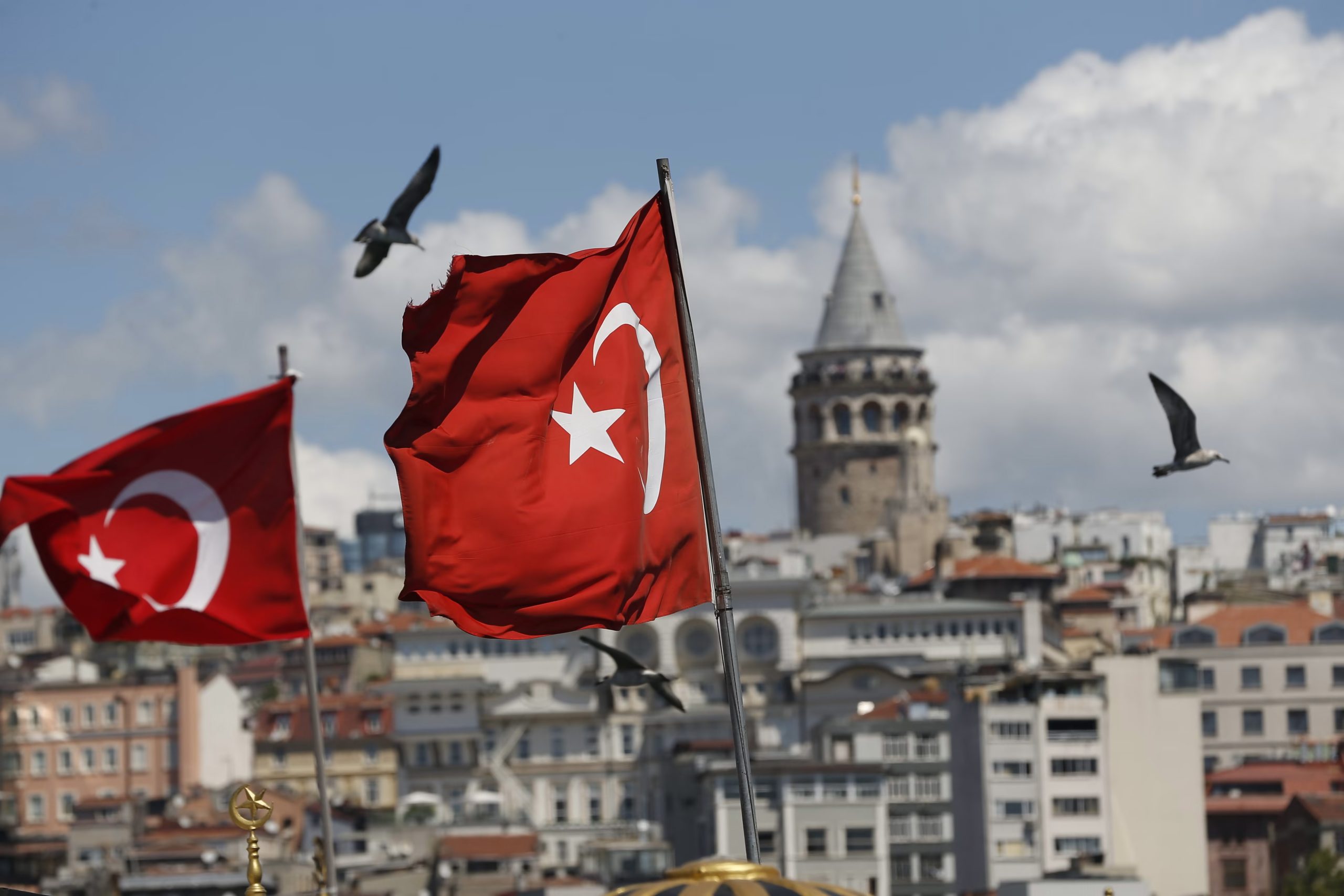
In Turkish, “hello” is typically translated as “Merhaba.” This warm and friendly greeting is commonly used in both formal and informal settings. When you enter a room or meet someone in Turkey, a cheerful “Merhaba!” is a perfect way to start a conversation and make a positive impression. It’s a simple yet essential word that reflects the welcoming nature of Turkish culture.
In Turkish, “thank you” is expressed as “Teşekkür ederim.” This phrase is used to convey gratitude and appreciation. When you want to show your thanks for a kind gesture, a helping hand, or simply to express your gratitude, saying “Teşekkür ederim” is a polite and courteous way to do so. It is a universally understood expression of thankfulness in Turkey and reflects the country’s culture of hospitality and respect for others. So, don’t hesitate to use this phrase when you want to show your appreciation to someone in Turkish-speaking regions.













